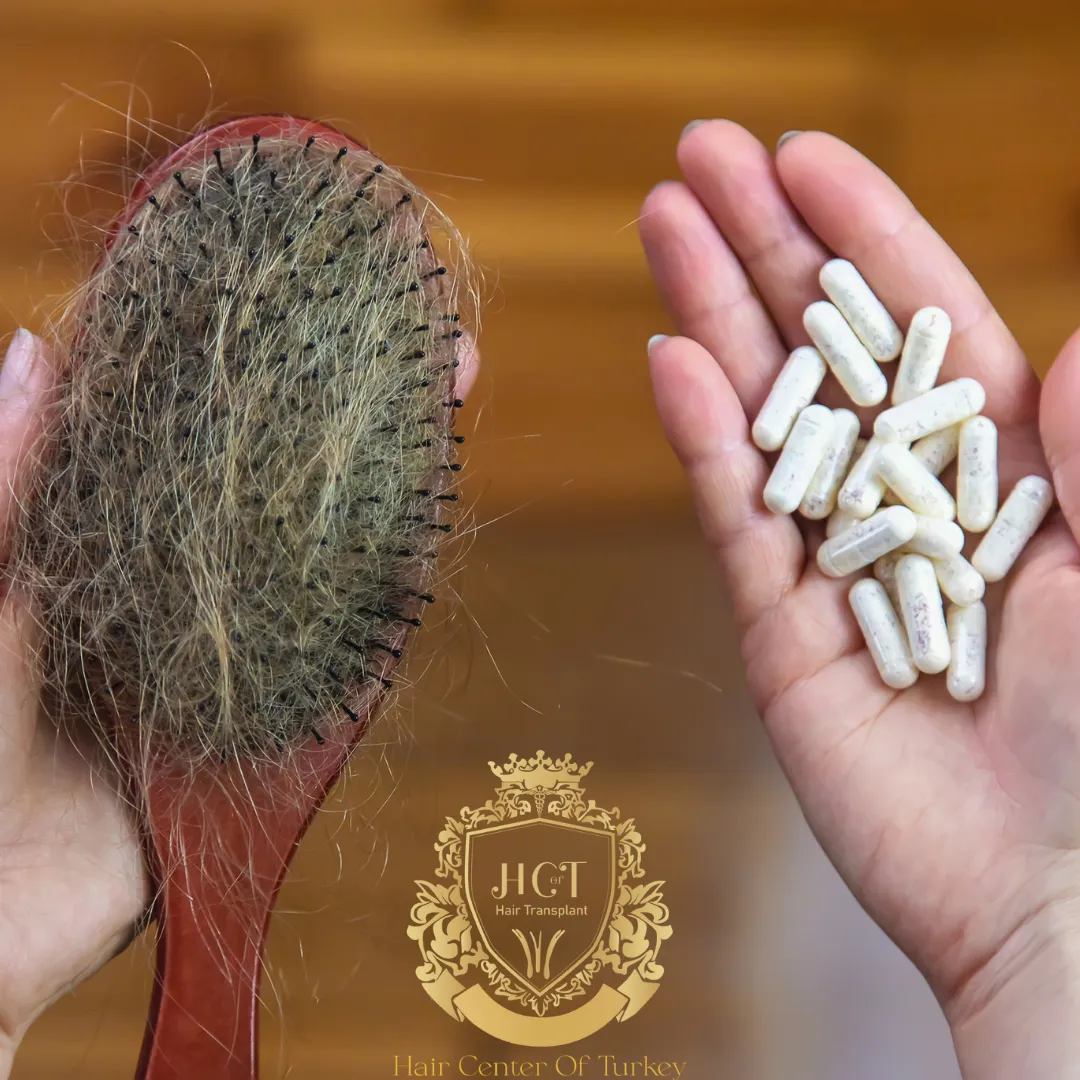
What Are The Best Vitamin Supplements For Hair Loss?
Vitamin supplements can help with hair loss when shedding is linked to a nutrient deficiency, such as low iron stores or low vitamin D. They rarely stop genetic hair loss on their own. The safest approach is testing first, correcting confirmed deficiencies, and avoiding high-dose vitamin A, selenium, or unnecessary biotin, which can backfire.

Table of Contents
Why Vitamins And Minerals Matter For Hair
Hair follicles are among the most active tissues in the body. They rely on steady protein intake plus key vitamins and minerals to support the hair growth cycle.
When levels drop, hair can shift into the shedding phase more easily, and strands may feel weaker and break faster. Correcting the underlying trigger is usually more effective than adding multiple supplements at once.
Before You Buy Supplements: What To Check First
Hair loss has many causes, including hereditary-patterned thinning, postpartum changes, thyroid problems, rapid weight loss, scalp inflammation, and medication side effects. Supplements only address the nutrient part of the puzzle.
If shedding is new, persistent, or patchy, a clinician may recommend blood tests to look for common deficiencies. A simple plan based on results is more reliable than guessing with high-dose blends.
Common Tests Your Clinician May Recommend
Depending on symptoms and your history, testing may include ferritin and iron studies, vitamin D, vitamin B12, thyroid function, and sometimes zinc. Your clinician may also evaluate inflammation or scalp conditions if itching or scaling is present.
The Best Supplements For Hair Loss When A Deficiency Is Confirmed
Iron (Ferritin And Iron Deficiency)
Low iron stores are a common, treatable contributor to diffuse shedding. Iron supports oxygen delivery to the follicle and helps keep hairs in the growth phase.
Iron supplements should be taken only when deficiency is confirmed, because too much iron can be harmful. If iron is low, your clinician may also discuss vitamin C intake to support absorption.
Vitamin D
Low vitamin D is frequently found in people who report hair thinning, and correcting low levels may support healthier cycling in some cases. Supplement choice and dose should match your blood level and overall health.
If your vitamin D is normal, extra dosing is unlikely to add benefit for hair and may increase side-effect risk at high doses.
Vitamin B12 And Folate
B12 and folate help with red blood cell formation and cellular turnover. Deficiency is more likely in people who follow vegan diets, have certain digestive conditions, or take specific long-term medications.
If blood tests show low levels, supplementation can support overall health and may reduce deficiency-related shedding over time.
Zinc
Zinc supports tissue repair and protein synthesis. Low levels can contribute to brittle hair and increased shedding, especially when diet is restricted.
Zinc is not a “more is better” nutrient. High doses can upset the stomach and, over time, may affect copper balance, so it should be used with guidance and an appropriate dose.
Protein And Amino Acid Support
Many people focus on vitamins while overlooking protein intake. Hair is primarily keratin, so steady protein across the day supports strength and reduces breakage.
If you struggle to meet protein needs through food, your clinician may suggest practical options like protein-rich snacks or shakes rather than stacking multiple vitamin products.
Supplements That Are Popular But Often Overused
Biotin
Biotin is widely marketed for hair, but true deficiency is uncommon. For most people, extra biotin does not address the underlying cause of shedding.
High-dose biotin can interfere with certain lab tests. If you take biotin, tell your clinician and lab staff before any blood testing so results are interpreted correctly.
Collagen
Collagen powders may improve how hair feels by supporting overall protein intake, yet they are not a targeted treatment for genetic thinning. If you use collagen, choose reputable brands and focus on consistent nutrition first.
Omega-3
Omega-3 supplements are often used for general skin and scalp support. Evidence for reducing hair loss is mixed, so they are best viewed as supportive rather than a primary treatment.
Vitamins That Can Worsen Hair Shedding When Overdone
Vitamin A
Vitamin A supports scalp and immune function, but high-dose supplementation can trigger shedding in some people. This risk is higher when vitamin A is stacked across multivitamins, hair gummies, and separate retinol products.
If you are already eating a balanced diet, avoid high-dose vitamin A unless a clinician recommends it for a medical reason.
Selenium
Selenium is essential in small amounts, yet excessive intake can contribute to hair shedding and other symptoms. Be cautious with “high potency” supplements that combine selenium with other trace minerals.
Should You Use Supplements Or Rely On Diet?
Food-first nutrition is usually the best foundation for hair. Whole foods provide nutrients in safer ratios, along with protein and healthy fats that support absorption.
Supplements can be useful when lab work confirms low levels or when diet limitations make it hard to meet needs. A focused plan is safer than taking several products at once.
How Long Until You See Results?
Hair growth is slow, so improvements often take time. When a deficiency is corrected, many people notice less shedding and stronger hair over 3–6 months.
If you see no improvement after several months, reassessment is worth it. You may be dealing with hereditary-patterned hair loss, scalp inflammation, or another trigger that supplements cannot solve.
Safety Tips Before Starting Any Hair Supplement
Check labels for overlapping ingredients, especially vitamin A, selenium, and zinc. Taking multiple “hair” products together can push doses higher than you realize.
If you are pregnant, breastfeeding, have thyroid disease, kidney disease, or take prescription medicines, ask a clinician before supplementing. Stop any supplement that causes rash, severe stomach upset, or worsening shedding.
Frequently Asked Questions
What’s the best vitamin for losing hair?
Vitamin D, if deficient, is most commonly linked to hair shedding.
Which vitamin is the best for hair fall?
Vitamin D, if deficient, is most commonly linked to hair shedding.
What vitamin is lacking if my hair is falling out?
Vitamin D is often low; also B12 and folate can contribute.
Which vitamin will stop hair fall?
No vitamin stops hair fall unless it corrects a deficiency, like D or B12.
What are the big 3 for thinning hair?
Finasteride, topical minoxidil, and ketoconazole shampoo are the common “Big 3” regimen.
Do vitamins for hair loss actually work?
They work only for true deficiencies; otherwise they rarely improve hair loss.




